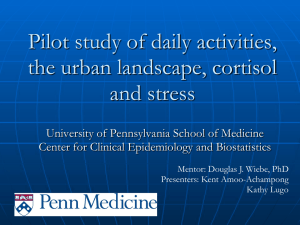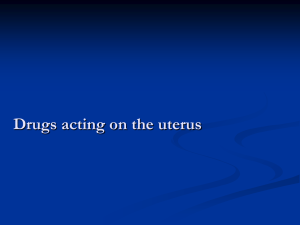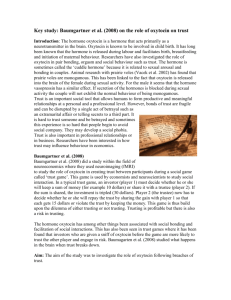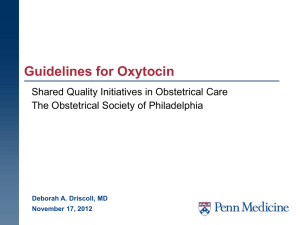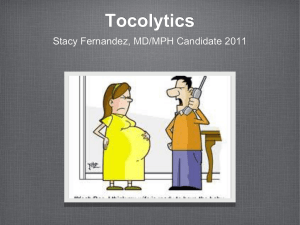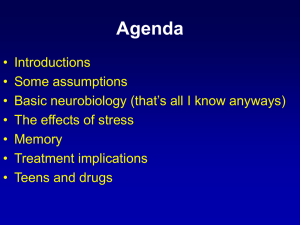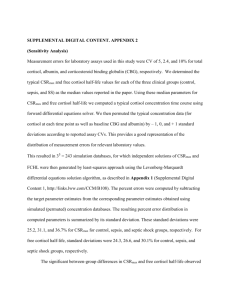Hormones - AP Psychology Community
advertisement
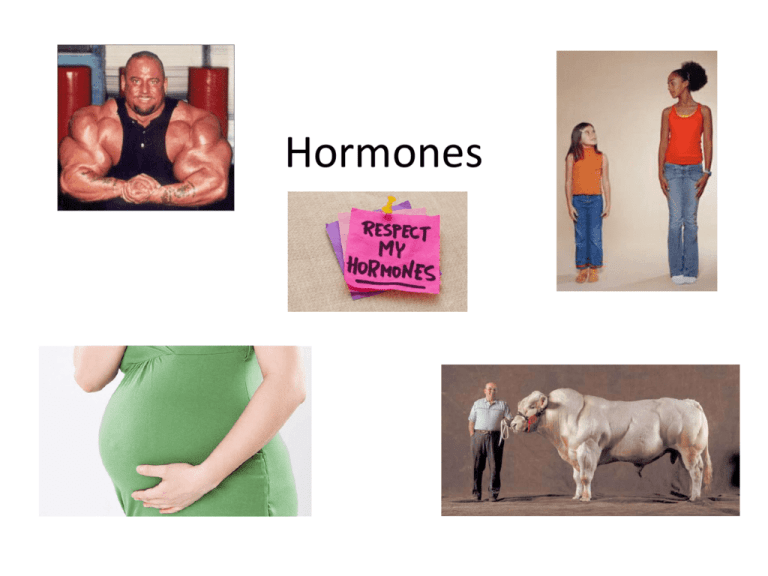
Hormones Using one or more examples, explain functions of two hormones in human behavior Hormones Chemical messengers secreted by glands. These glands are part of a system called the endocrine system. Cortisol and Memory • Cortisol is a hormone produced by the adrenal glands in response to stress and to restore homeostasis. • Chronic stress may result in prolonged cortisol secretion… • Which can damage the immune system and impair memory. Newcomer et al (1999) Experiment on Cortisol and Memory Aim: To investigate how levels of cortisol levels interfere with verbal declarative memory. Newcomer et al (1999) Experiment on Cortisol and Memory Procedure: A self selected sample (through and advertisement) of 51 normal and healthy people ages 18-30 was used. • Randomized, controlled and double-blind. • Three conditions…. Newcomer et al (1999) Experiment on Cortisol and Memory • Condition 1: High level of cortisol (160 mg tablet), was given. Same as cortisol released in a stressful event. • Condition 2: Low level of cortisol (40mg tablet). Same as minor stressful event. • Condition 3: A placebo Newcomer et al (1999) Experiment on Cortisol and Memory Results: • The high level group performed worse on verbal memory test than the low level group and placebo group. • The low level group showed no memory decrease. Newcomer et al (1999) Experiment on Cortisol and Memory Evaluation • It was controlled and randomized so it was possible to establish a cause and effect relationship. • They received informed consent. • Negative effect of cortisol levels was reversible so no harm was done. Oxytocin and trust • Oxytocin is secreted by the hypothalamus into the brain and into the bloodstream via the pituitary gland. • Linked to increase in trust. • Evolutionary psychologist say trust was critical in forming relationships or staying away from bad ones. • Learning to trust in vital for survival. • One way it could work is by reducing fear reactions via the amygdala as a consequence of betrayal. Baumgartner et all (2008) The role of oxytocin in trust in economic behavior. • Aim: To investigate the role of oxytocin after breaches of trust in the trust game. • Procedure: The participants played a trust game used by scientists to study social interaction. Baumgartner et all (2008) The role of oxytocin in trust in economic behavior. Procedure: • “Investor” player 1 gets a sum of money and must decide whether to keep it or share it with a “trustee” (player 2). • What is shared is tripled. • Player 2 must decide if the sum should be shared (trust) or kept (violation of trust). Baumgartner et all (2008) The role of oxytocin in trust in economic behavior. Procedure • fMRI scans were carried out on all participants. • They received either oxytocin or placebo via a nasal spray. • Participants played against different trustees and were given feedback when the trust was broken by the experimenter. Baumgartner et all (2008) The role of oxytocin in trust in economic behavior. Results • Participants in the placebo group showed less trust after feedback of betrayal. They invested less. • Participants in the oxytocin group continued to invest at similar rates after receiving feedback of breech of trust. Baumgartner et all (2008) The role of oxytocin in trust in economic behavior. • The fMRI scan showed decreases in responses in the amygdala and caudate nucleus. • Amygdala is a part of our brain that is involved in basic emotions and has many receptors for oxytocin. • The caudate nucleus is involved in learning and memory and plays a role in reward related responses and trust. Baumgartner et all (2008) The role of oxytocin in trust in economic behavior. Evaluation • Oxytocin could explain why people are able to restore trust and forgiveness in long-term relationships. • fMRI gave us an idea about a possible correlation but gave us nothing definite about cause and effect. • Giving the oxytocin artificially may not reflect a true physiological process. • Oxytocin is very complex and it is too simplistic to call it the :trust hormone”.
